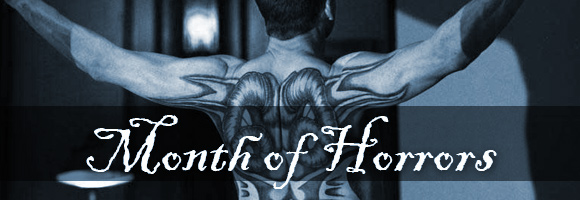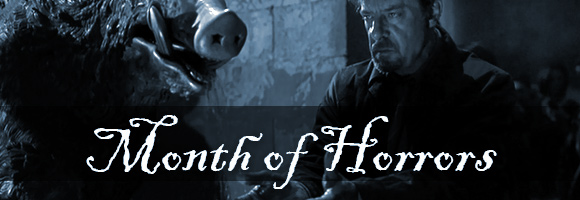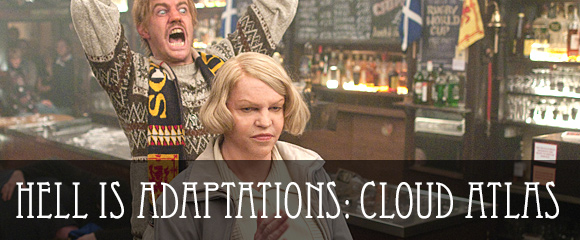Hell is Adaptations: Never Let Me Go
Never Let Me Go by Kazuo Ishiguro, Published: Faber and Faber (2005), Awards Nominated: Arthur C. Clarke Award
Never Let Me Go, directed by Mark Romanek (2010)
This review is going to be a little different from my usual pattern, since I’m simultaneously reviewing the novel Never Let Me Go, by Kazuo Ishiguro, and the movie adaptation Never Let Me Go, by director Mark Romanek. The focus will be on comparisons between the two representations of the story, so I will have to discuss the content of the story in some detail. This means, there will be some spoilers of Never Let Me Go, both book and movie version, in this review.
Month of Horrors / Hell is Adaptations: Hannibal Rising

To say that Hannibal Rising is the worst of the Hannibal Lecter films is not necessarily a derogatory statement. After all, the Lecter films range from surreal and thrilling (Manhunter), to profound yet action-packed (The Silence of the Lambs), to baroque and experimental (Hannibal), and finally to popular yet solid (Red Dragon). While Hannibal Rising seems like the least necessary film in the series, it’s easy to forget how much call there was for this story to be told. After the hints of Lecter’s past in Hannibal the novel, there was suddenly a market for a Lecter prequel of some sort, but especially one that fleshed out the horrific experiences of the doctor’s early childhood.
For those who haven’t read the novel, Hannibal delves deeply into the cannibal’s psyche, showing us that he makes use of a classical-medieval mental technique known as the Memory Palace. First explained by Cicero, the Memory Palace is a mnemonic device that associates facts and memories with a physical structure that one creates within his mind. (The BBC series Sherlock makes use of this device, as well.) This is to help explain Lecter’s superior intellect and mental capacity, but also to give the reader hints of his formative years. While walking through his palace in search of a memory, Lecter has to be careful to avoid certain places that contain memories that can harm him, especially memories of his young sister Mischa, who died under grotesque circumstances during World War II. These come to a head at the climax of the novel, when he attempts to brainwash Clarice Starling into becoming his sister, and he can’t help but remember that Mischa was eaten by Nazi deserters trying to survive a harsh winter while avoiding Soviet forces.
Month of Horrors / Hell is Adaptations: Red Dragon

Considered at the time to be the black sheep of the Hannibal Lecter cinematic family, Red Dragon retells the story of Thomas Harris’ first Lecter novel. That’s not quite fair though, because Dragon wasn’t Lecter’s story, but Will Graham’s. It’s an important point to make, because even though Lecter would quickly take over as the most interesting character in this shared fictional universe, Red Dragon the novel is the story of Will Graham, an FBI agent and profiler who excels because of his ability to empathize with just about anyone, even serial killers.
Unfortunately, his special abilities are put to use in solving the Chesapeake Ripper case, where the killer has apparently been removing random organs from his victims. Except that these organs were actually being chosen with great care to prepare various dishes. And when the trail leads Graham to Dr. Lecter’s office, he is nearly disemboweled before managing to shoot Lecter and call for help.
Month of Horrors / Hell is Adaptations: Hannibal

After establishing a solid crime thriller formula with Red Dragon and The Silence of the Lambs, novelist Thomas Harris took a chance and tried something entirely different with his wildly popular Hannibal Lecter character: he set him free. Harris’ fans had been wondering for some time what the cannibal psychiatrist would be like in the wild, as it were, out of captivity and free to roam as he pleased. Written eleven years after Silence the novel and eight years after the film, Hannibal is the gory, violent, and disturbing followup to his increasingly popular series. Did it live up to its promise?
It’s hard to say. The next Lecter novel had two very difficult tasks: to tell a story centered for the first time around Dr. Lecter that did justice to everything his readers had learned about him in Dragon and Silence, and to write something that would please the many fans of the film. Even the choice to write a novel with Lecter as a main protagonist must have been a difficult one. It would have been much easier to keep him as a secondary character with Clarice Starling or another FBI agent in the foreground. Harris had built up the mystery and abilities of Dr. Lecter so greatly that it would seem impossible to actually write a story that lived up to what it was claimed he could do when not imprisoned.
Month of Horrors / Hell is Adaptations: The Silence of the Lambs

“Memory, Agent Starling, is what I have instead of a view.”
It’s easy to understand how Manhunter and its source material Red Dragon lost much of its staying power after the release of The Silence of the Lambs in 1991. This is the film that made many people ridiculously famous: Anthony Hopkins, Jodie Foster, Ted Levine, Jonathan Demme, and Thomas Harris, among others. It won five Academy Awards in one swoop, beating out The Prince of Tides (for Best Picture), JFK (Best Director), Cape Fear (Best Actor), Thelma & Louise (Best Actress), and Fried Green Tomatoes (Best Adapted Screenplay).
Unlike Harris’ novel, Silence the film is a standalone piece that makes no reference to the earlier story, ignoring the novel’s many reference’s to Red Dragon’s protagonist Will Graham, now living as a disfigured drunk somewhere in Florida, and inferring that Graham’s boss Jack Crawford was the one who caught the notorious cannibal psychiatrist Dr. Hannibal Lecter. For the purposes of adaptation to a new medium, it’s understandable that many changes would need to be made, but it’s actually fascinating how well the finished product works both as a standalone piece of art and as an adaptation.

“I ate your script with a Montrachet and a side of red caviar.”
Month of Horrors / Hell is Adaptations: Manhunter

Watching Michael Mann’s Manhunter is something like watching a now-famous actor in a commercial filmed at the beginning of his career; except that here the actor is a character, and the character is Dr. Hannibal Lecter. Yes, this year’s Month of Horrors will feature a crossover with our Hell is Adaptations series in an overview of all the films adapting the Hannibal Lecter novels.
What is especially noticeable to fans of later Lecter films is the scarcity of the popular cannibal in this 1986 crime thriller. It seems a little silly to assume that anybody would need an introduction to the character of “Hannibal the Cannibal,” but perhaps a quick overview is in order for the few newcomers. Originally created for Thomas Harris’ 1981 crime novel Red Dragon, Dr. Hannibal Lecter is an extremely intelligent serial killer from Eastern Europe who ate his victims and avoided detection and arrest for many years before being caught almost by chance by FBI agent William Graham, a man who has the ability to empathize with killers and figure them out from the inside. Dr. Lecter worked both in an emergency room and later as a psychiatrist, and used his medical knowledge to commit and hide his violent crimes. In many of the media adaptations of the Lecter novels, the cannibal doctor often serves as a guide to help the FBI apprehend other serial killers, though usually with the intention of playing both sides of the game.
Hell Is Adaptations: The Innocents

Only make the reader’s general vision of evil intense enough, I said to myself . . . and his own experience, his own imagination, his own sympathy (with the children) and horror (of their false friends) will supply him quite sufficiently with all the particulars. Make him think the evil, make him think it for himself, and you are released from weak specifications.
—Henry James, 1908 Preface to the New York Edition of The Turn of the Screw
In considering which genre film adaptations to take a look at for WWEnd’s new blog series, I thought I’d begin with that most unusual case—a successful film adaptation of one of my favorite novels; one that manages to respect the original story while using the tools of cinema to elucidate that story in ways not possible on the printed page. Instead of nitpicking the alterations from print to screen and wondering what in the world the filmmakers were thinking (which, unfortunately, tends to be my response to film adaptation of novels I admire, more often than not), upon re-watching The Innocents, the 1961 adaptation of Henry James’s The Turn of the Screw, I found myself admiring the ways in which the filmmakers had added their own touches to the story, indicating a real understanding of the essential ambiguity that defines The Turn of the Screw, while not merely giving the audience a slavish recreation of the original.
Hell is Adaptations: Carrie

Horror fans owe Tabitha King a dozen roses, a box of chocolates, something. When her husband Stephen tossed the unfinished manuscript of his first novel into the trash, it was Mrs. King who fished it out, read it over, and convinced him to finish it. And so we have Carrie and possibly all that has come after it.
I am not a Stephen King reader, and so, almost forty years after its publication, Carrie is the first of his novels I have read. However, on whatever Friday in 1976 Brian de Palma’s film version opened in Dallas, I was in line. I had seen de Palma’s films Sisters, Phantom of the Paradise, and Obsession and loved them all – well, maybe I admired Obsession more than it loved it. Those films and a poster featuring Sissy Spacek covered in blood got myself and some friends to the theater for that Friday bargain matinee. We expected to enjoy ourselves. We had no idea just how much fun the next ninety-eight minutes were going to be.
Hell is Adaptations: Cloud Atlas

When British writer David Mitchell published Cloud Atlas, the novel struck the reading public as a daring, multilayered work. It was a critical and commercial success, yet seemed impossible to adapt to the big screen. Yet as the story goes, Nathalie Portman shared her love for the novel with the Wachowskis during the filming of V for Vendetta, and the two siblings determined to do the impossible, and bring the book to the big screen.

Photo from the script meeting.
Hell is Adaptations: The Hobbit: An Unexpected Journey

While writing this installment of Hell is Adaptations, I briefly entertained the perverse notion of splitting this into three, and bloating it with a lot of sidetracks and irrelevant nonsense. I’m sure you can see where this is going, yes? Peter Jackson’s film adaptations of the Lord of the Rings trilogy were serviceable, even though I think the material spiraled out of his control by the third movie, but with The Hobbit he stopped even pretending to respect the source material.
Jackson had originally pitched filming The Hobbit as the first part of a trilogy, with LOTR being adapted as the latter two parts. After a great deal of studio debate, New Line decided to fund a full LOTR trilogy, and The Hobbit got pushed onto the back burner. As it turned out, the LOTR films were a big hit financially, so talk about a Hobbit adaptation made quite the buzz even before the first trilogy had been fully released. Unfortunately for New Line, lawsuits concerning the earnings of the LOTR trilogy were filed both by Peter Jackson and the Tolkien Estate, causing the rights and financial prospects for the Hobbit film adaptation to be entangled by court intrigue for years.

Burn, baby, burn.



















 Full Details
Full Details




